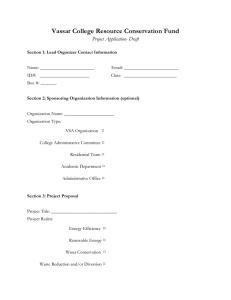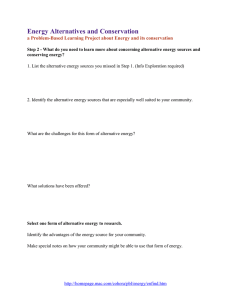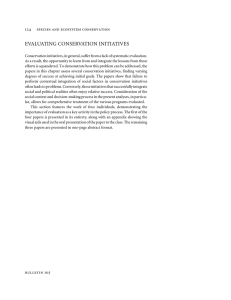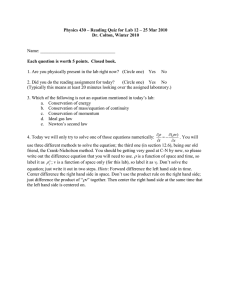The Principle of Conservation
advertisement
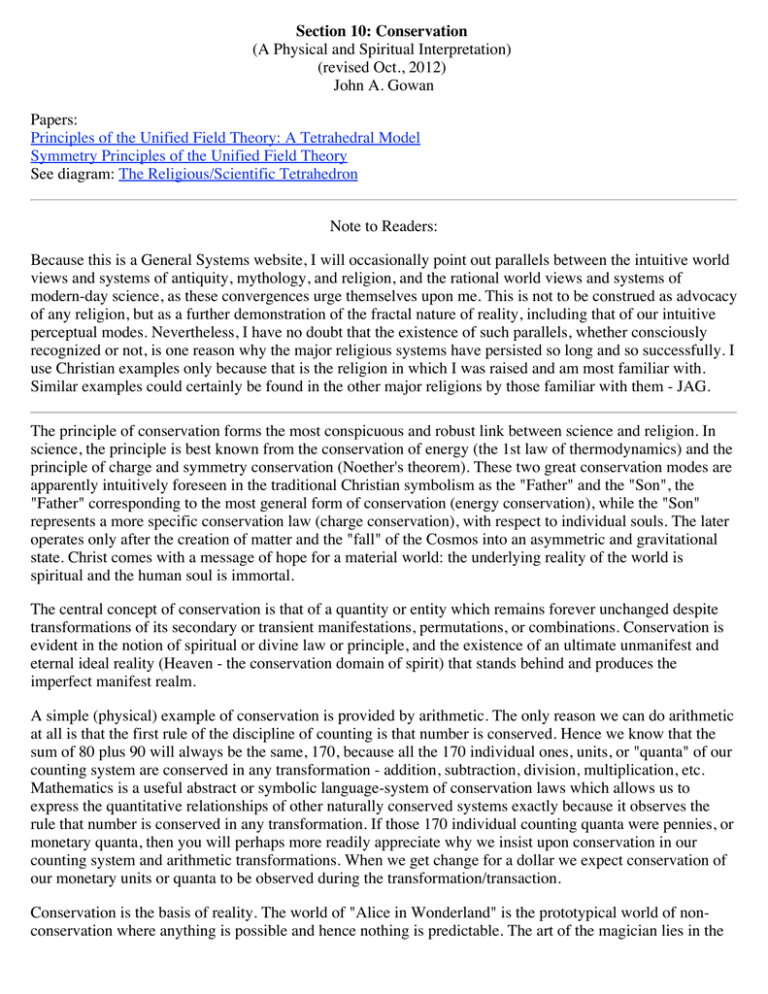
Section 10: Conservation (A Physical and Spiritual Interpretation) (revised Oct., 2012) John A. Gowan Papers: Principles of the Unified Field Theory: A Tetrahedral Model Symmetry Principles of the Unified Field Theory See diagram: The Religious/Scientific Tetrahedron Note to Readers: Because this is a General Systems website, I will occasionally point out parallels between the intuitive world views and systems of antiquity, mythology, and religion, and the rational world views and systems of modern-day science, as these convergences urge themselves upon me. This is not to be construed as advocacy of any religion, but as a further demonstration of the fractal nature of reality, including that of our intuitive perceptual modes. Nevertheless, I have no doubt that the existence of such parallels, whether consciously recognized or not, is one reason why the major religious systems have persisted so long and so successfully. I use Christian examples only because that is the religion in which I was raised and am most familiar with. Similar examples could certainly be found in the other major religions by those familiar with them - JAG. The principle of conservation forms the most conspicuous and robust link between science and religion. In science, the principle is best known from the conservation of energy (the 1st law of thermodynamics) and the principle of charge and symmetry conservation (Noether's theorem). These two great conservation modes are apparently intuitively foreseen in the traditional Christian symbolism as the "Father" and the "Son", the "Father" corresponding to the most general form of conservation (energy conservation), while the "Son" represents a more specific conservation law (charge conservation), with respect to individual souls. The later operates only after the creation of matter and the "fall" of the Cosmos into an asymmetric and gravitational state. Christ comes with a message of hope for a material world: the underlying reality of the world is spiritual and the human soul is immortal. The central concept of conservation is that of a quantity or entity which remains forever unchanged despite transformations of its secondary or transient manifestations, permutations, or combinations. Conservation is evident in the notion of spiritual or divine law or principle, and the existence of an ultimate unmanifest and eternal ideal reality (Heaven - the conservation domain of spirit) that stands behind and produces the imperfect manifest realm. A simple (physical) example of conservation is provided by arithmetic. The only reason we can do arithmetic at all is that the first rule of the discipline of counting is that number is conserved. Hence we know that the sum of 80 plus 90 will always be the same, 170, because all the 170 individual ones, units, or "quanta" of our counting system are conserved in any transformation - addition, subtraction, division, multiplication, etc. Mathematics is a useful abstract or symbolic language-system of conservation laws which allows us to express the quantitative relationships of other naturally conserved systems exactly because it observes the rule that number is conserved in any transformation. If those 170 individual counting quanta were pennies, or monetary quanta, then you will perhaps more readily appreciate why we insist upon conservation in our counting system and arithmetic transformations. When we get change for a dollar we expect conservation of our monetary units or quanta to be observed during the transformation/transaction. Conservation is the basis of reality. The world of "Alice in Wonderland" is the prototypical world of nonconservation where anything is possible and hence nothing is predictable. The art of the magician lies in the creation of the illusion of non-conservation: "now you see it, now you don't". Fiction, fantasy, and the realm of our imagination are worlds of non-conserved reality, crucially important to our creative process, which is essentially a passage from the unconserved realms of thought (without restrictive rules), to the conserved realm of matter (with restrictive rules). The passage from the universal human fantasy of flight to the reality of the airplane is an excellent example of this transformation. One of the fundamental differences between humans and animals is the non-conserved creative fantasy lives of humans, and our ability to bring them, if only by degrees and through a massive social effort, into conformity with the conserved reality of natural law and daily life. Free and Bound Energy The common basis of reality for both free and bound energy, light and matter, is the "trinity" of principle and conservation law: The Conservation of Energy, the Principle of Entropy, and The Conservation of Symmetry, formalized as the 1st and 2nd laws of thermodynamics and "Noether's Theorem". Matter adds to this common base a 4th domain unique to itself: Causality (law of cause and effect) and Information. Taken together, Causality and Information are succinctly characterized by the ancient notion of "Karma". The story of Creation is the story of the passage of free energy from this common immaterial base of natural law to an additional 4th dimension and domain of material Causality and Information, in Genesis as in science. In both cases, this is the passage from the symmetric system of light to the asymmetric system of matter, in physics formalized by Einstein's energetic equivalence between free and bound energy as E = mcc. In both cases, a tenuous connection and interaction with the former symmetric realm remains to remind the "fallen" material system of its former glory. In traditional Christian religious thought, man retains a connection with the spiritual realm through his own soul (his own conserved spiritual nature); in physics, matter retains a connection to space and light through its own gravitational field and through its "Identity" charge. A "trinity" of conservation principles (Energy Conservation, Symmetry Conservation, and Entropy) underwrites the physical as well as the spiritual domain. The physical system conserves: 1) free energy as the mass and momentum of particles; 2) symmetry as the charges (and spin) of matter, and as the inertial and gravitational forces of the metric; 3) the spatial entropy drive of free energy (the intrinsic motion of light) as the historic entropy drive of bound energy (the intrinsic motion of matter's time dimension). Gravitation is the force which converts space and the drive of spatial entropy to time and the drive of historical entropy (via the annihilation/transformation of space) - and vice versa (via the annihilation/transformation of mass - as in the stars). (See: "The Double Conservation Role of Gravitation".) The ability of the Cosmos to conserve free energy as bound energy allows the energy content of the Universe to escape the destructive spatial entropy drive gauged by "velocity c" (the intrinsic motion of light), and acquire the benign historical or bound energy entropy drive gauged by "velocity T" (the intrinsic motion of time). The conversion of free energy to mass energy (E = mcc) is the basic conservation measure which brings others in its wake (symmetry and entropy conservation - charge, time, and gravity), and creates the possibility of asymmetric information storage, local matter, historic causality, and evolutionary time. See: Spatial vs Temporal Entropy. The physical transformation of the immaterial realm of light and space into the material form of matter and time is intuitively realized and symbolically represented in the Christian tradition as the impregnation of Mary by the Holy Spirit. The message of a new and individual form of conservation (charge conservation, the conservation of individual souls) is then brought to the world through Christ, who proceeds to demonstrate the same through his personal death and resurrection. Causality, Gravity, Time, and Conservation Spacetime is the joint dimensional conservation domain of free and bound energy: the temporal component is necessary to accommodate the energy accounts of bound energy's relative (rather than absolute) motion. Light or free energy has no time dimension, an essential characteristic of light's intrinsic motion and symmetric "non-local" spatial energy state. Matter, on the other hand, is spatially immobile and "local", having a specifiable position in space and time. Matter's time dimension is part of this local specification, but matter also needs a time dimension so it can move in space, for otherwise there would be no way to order matter's causal linkages or balance matter's variable energy accounts, since matter's energy content varies with the "local" and relative character of its motion. Light does not need this temporal accounting system, since light's constant "non-local" intrinsic motion is "absolute" rather than "relative". Light's energy varies with frequency, not velocity; and the velocity of light is invariant regardless of the relative motion of source or observer. It is only because of light's peculiar "absolute" motion (or rather light's non-local symmetric energy state) that light does not require a time dimension. Time or "velocity T" is matter's historical entropy drive, causing the aging and decay of matter and information, and the expansion and dilution of history, just as velocity c causes the expansion and cooling of free energy and space. History is the temporal analog of space, the temporal conservation domain of information and matter's "causal matrix". History is the information component of spacetime, binding matter together in a dimensional causal matrix just as space binds light together in a dimensional but acausal conservation matrix. The "local" condition of matter requires time not only to regulate its motion and provide an entropy drive, but also to provide a causal linkage between all its motions. Because matter is "local", the sequence of cause and effect must be strictly observed or energy conservation will be violated. Light is "non-local" and hence "acausal" - because of light's lack of a temporal dimension, the sequence of cause and effect is meaningless for light. However, the historical connection and causal linkage of events is crucial for the existence of matter - the causal linkage between today and yesterday upholds the reality of the present moment; if it were ever broken, today would cease to exist, having no history, no past, no cause to sustain the effect of its continued existence. The causal linkage of matter with history extends back to the creation of the atoms in the Big Bang. Light is non-local, atemporal, and acausal; matter is local, temporal, and causal. Temporal causality and the historic conservation domain of information are required to conserve matter's energy of motion and to sustain the causal linkage to the "universal present moment" of all massive energy forms. Furthermore, time is also required to provide the entropy drive of bound energy. Because time is the product of gravity, the creation of matter's historic causal domain and temporal entropy drive (in the service of energy conservation) is one of several rationales for gravitation - the conservation of light's non-local symmetric energy state is another. All roles are served simultaneously by gravity's "location" charge, whose active principle is time. See: "The Double Conservation Role of Gravitation". The Historic Conservation Domain of Information Gravity, the entropy conversion force (converting the intrinsic motion of light to the intrinsic motion of time and vice versa), is also fundamentally a connecting force. Gravity connects matter to space, time, and ultimately to light; gravity creates time, time creates causal linkages and causal matrices; causal matrices create history. History is the crucial causal connection of all past events to the Universal Present Moment. History is the conservation domain of information and the "causal matrix" of the material Universe; history is the temporal analog of space. History (historic spacetime) is where time goes when it exits space at right angles to all 3 spatial dimensions. The historical domain of spacetime is exampled by the 2.2 million lightyear gap of historic spacetime that separates us from the Andromeda galaxy in the Universal Present Moment. History is where we all continue to exist in our yesterdays, supporting the reality of today: we are all immortal in spacetime and the historic conservation domain of information (matter's "causal matrix"). See: "A Spacetime Map of the Universe". Gravitation, time, and the historic causal matrix (historic spacetime), are the fundamental dimensional expressions of conservation in the material realm. The central Causal-Information apex of the Tetrahedron Model has its raw energy conservation interaction through the conversion of non-local free energy to local mass; its entropy interaction through time, the historic causal matrix and evolution; its symmetry interaction through charge and spin conservation and the inertial forces of the metric. Gravitation, the creator of time, is necessarily involved in both entropy and symmetry conservation. These three conservation principles (producing time, mass, charge) are necessary to allow the breaking of the symmetry of the primordial matterantimatter particle pairs, producing the information contained in the elements of the Periodic Table. (These are necessary but not yet sufficient conditions for symmetry-breaking. An (unexplained) asymmetry in the interaction of the weak force with matter vs antimatter is also necessary to effect the creation of matter during the "Big Bang".) (See: "The Origin of Matter and Information".) Religion and Science The evolution of the historical matrix of information provided by the combinations and permutations of the elements of the Periodic Table of the Elements is driven by matter's search for antimatter and a return path to its original symmetric state of light and free energy. The basic function of Information (in the elemental form of conserved charges) is to provide a roadmap or guide for matter on this return path. This function endures even though the map becomes enormously more complex, elaborated, and embellished in the higher levels of the cosmic fractal. The ontogeny of the Cosmos becomes the allegory of religion, the ontology of science, and the journey toward enlightenment of humanity. As atoms are an asymmetric, material form of light, and charge is an asymmetric, material form of an ideal state of symmetry, so we consider human beings as an asymmetric, physical form of an ideal state of information - contained and conserved from the beginning in the charges of our constituent atoms. Energy, entropy, symmetry, conservation, connection, causality, information, identity, evolution - all these terms are essential to the miracle of life in the Universe, and all of them have a ready interpretation in either spiritual/religious terms or physical/scientific terms. The biblical notion that "man is created in the image and likeness of God" will be seen by some as an overly audacious reach for significance and meaning in human life, but looking at the plain facts of science as currently understood, it would be difficult to prove this assertion wrong. Life is the information pathway by which the Universe comes to know and experience itself, including evolving new modes of creativity and new forms of beauty. In a thoroughly fractal Universe, there is no reason to believe we are anything less than beloved children of the universe, the multiverse, or "God" the primordial Energy, Information, and Creative Principle - the "First Cause", or "Prime Mover" of the Universe. In addition to its strong social (indeed, governmental) function, religion affirms the significance of humanity by finding a God in Nature. Humans are of greater importance if there is a God in the Universe, especially one who takes notice of them. Science strips this significance from the universe and man, and furthermore provides little if any social cohesion. Religion is an institutionalized (social) symbolic and intuitive portrayal of reality while science is a factual and quantitative exploration of the same. Science explains our lives but religion gives them meaning. Religion must respect scientific facts while science must respect the religious search for the significance of the universe and human life. Both need to recognize they are not enemies and have much to teach each other. Life is the great and obvious miracle of the Universe. Science must learn how to put that miracle back into its mechanistic explanations of fact. People are starved for the miraculous - witness the popularity of "Lord of the Rings", "Harry Potter", and similar fiction. Science will not win the hearts and minds of people until it understands how to give human life and experience the equivalent significance and meaning as does religion. You do not win elections by telling people they are statistically insignificant, ephemeral cyphers in a vast and meaningless Cosmos - while your competition is telling them they are beloved children of the Creator of the Universe with immortal souls. Links: General Topics: The Fractal Organization of Nature Section III: Introduction to Fractals The Fractal Organization of Nature (table) Part 1: Microphysical Realm Part 2: Biophysical Realm Part 3: Astrophysical Realm Part 4: Metaphysical Realm - Intuitive Mode Part 5: Metaphysical Realm - Rational Mode Part6: The Fractal Organization of Nature (summary) (text) Newton and Darwin: The Evolution and Abundance of Life in the Cosmos Commentary on the Metaphysical Realm (rational mode) The Human Connection Information Section VI: Introduction to Information Chardin: Prophet of the Information Age Negentropic Information The Information Pathway (text) The Formation of Matter and the Origin of Information Nature's Fractal Pathway The Destruction of Information The Information Ladder (table) General Systems and Metaphysics Section VIII: Introduction to General Systems, Complex Systems Synopsis of the "Tetrahedron Model" of the Unified Field Theory Spiritual and Scientific Principles of the Tetrahedron Cosmic Energy Model A General Systems Analysis of the Creative Process in Nature Section XII: Man's Role in Nature Section XIII: The Solar Archetype Is There Life After Death? The Grail and Hourglass Diagrams Human Life-Span Development General Systems 4x3 Models "Trance, Art, Creativity" An Investigation of the Numinous Element and the Metaphysical Realm. A Book by Prof. John C. Gowan, Sr. Stewart C. Dodd's 4x4 Mathematical General System Matrix Unified Field Theory Section I: Introduction to Unification Section X: Introduction to Conservation Section IX: Symmetry: Noether`s Theorem and Einstein's "Interval" Section XIV: Causality Symmetry Principles of the Unified Field Theory (a "Theory of Everything") - Part I; Part II; Part III (summary) Unified Field Table: Simple Form Principles of the Unified Field Theory: A Tetrahedral Model The "Tetrahedron Model" vs the "Standard Model" of Physics: A Comparison Gravitation Section II: Introduction to Gravitation A Description of Gravitation Entropy Section VII: Introduction to Entropy Entropy, Gravitation, and Thermodynamics Spatial vs Temporal Entropy Currents of Symmetry and Entropy The Time Train The Halflife of Proton Decay and the 'Heat Death' of the Cosmos Tables and Diagrams: Unified Field Theory The Interaction of 4 Conservation Laws with the 4 Forces of Physics Parameters of Energy in the Cosmic Tetrahedron Model Unified Field Table: Simple Form The Higgs Boson and the Evolutionary Eras of the Cosmos Unified Field Table: "Bare" Form Physical Aspect of the Metaphysical Realm as a 4x4 Table The Particle Table Gravity Diagrams A New Gravity Diagram The Gravity Diagram The Three Entropies: Intrinsic Motions of Gravity, Time, and Light home page
